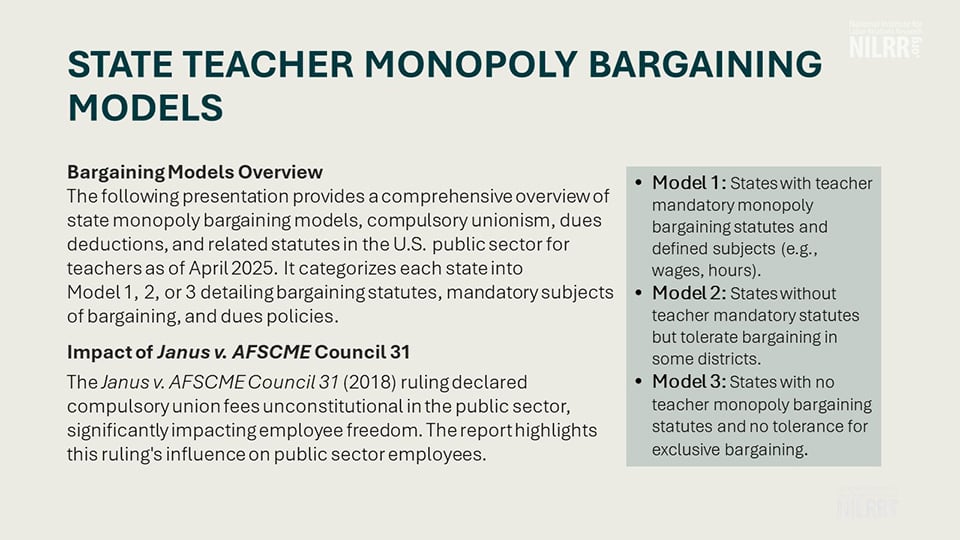Unlocking Teacher Freedom: A State-by-State Dive into Big Labor’s Legislated Power and Post-Janus Realities

Imagine a world where teachers aren’t locked into labor union dues they never wanted, where bargaining power isn’t monopolized by a single union entity, and where educators have real choice in shaping their careers. Sound like a reformer’s dream?
Well, thanks to the landmark 2018 Supreme Court decision in Janus v. AFSCME, that dream is inching closer to reality for public sector teachers across America. But how far has it gone?
A fresh April 2025 report (LINK to report) from the National Institute for Labor Relations Research (NILRR), with insights provided by Attorney Milton Chappell and the National Right to Work Legal Defense Foundation, peels back the layers on state laws governing teacher unions, monopoly bargaining, and dues deductions. It’s a must-read roadmap for anyone passionate about education reform—whether you’re a classroom teacher tired of mandatory fees and monopoly bargaining or a policymaker eyeing systemic change.
NILRR’s report categorizes all 50 states plus D.C. into three models based on how they permit “monopoly bargaining”—that exclusive right unions often hold to negotiate on behalf of all teachers, willing or not.

Here’s the breakdown that might just spark your next reform initiative:
- Model 1: Big Labor Strongholds (35 States + D.C.)
These are the heavy hitters where laws explicitly mandate monopoly bargaining, often covering wages, hours, and working conditions. Think California, New York, and Illinois, where unions like the NEA or AFT wield significant influence. Post-Janus, nonmember forced fees are off the table (unconstitutional!), but union member dues deductions can still auto-pilot if baked into payroll deduction contracts or collective bargaining agreements. Revocation rules vary wildly—some states like New Jersey tie it to your “employment anniversary,” while others, like Idaho, let you opt out anytime with a simple written note. Intriguing twist: Even here, employee protections are beginning to show, with states like Wisconsin curbing union perks through limited bargaining scopes. - Model 2: The Grayer Zones (8 States)
No outright bargaining laws, but unions are “tolerated” in spots—like Alabama’s required union consultations or Missouri’s constitutional nod to bargaining, but only if the public employer agrees to bargain. This middle ground offers fertile soil for reform: Teachers in places like Colorado or Virginia might negotiate locally, but without statewide mandates, and innovative districts could experiment with teacher-led alternatives. Dues? Voluntary for public sector teachers but watch for sneaky union-protective auto-deductions that require individual proactive revocation limitations. - Model 3: The Freedom Frontiers (8 States)
The beacons of choice! States like Arizona, Georgia, and Texas ban monopoly bargaining altogether by statute or attorney general opinions, giving teachers true independence. Right-to-work protections shine here, prohibiting forced unionism for both public and private sector. Dues deductions? In many of these states, school districts are prohibited from making dues deductions. Where allowed, most states make revocation a breeze—Utah even declares it “revocable at will” starting July 2025. For reformers, these states model what an AFT-NEA-monopoly-free education landscape could look like: more focus on merit, less on unionized collective mandates.
What makes this report a game-changer? It spotlights the lingering shadows of pre-Janus eras—outdated statutes for “agency shops” (forced fees) that are now toothless but still on the books in many spots.
Teachers, take note: Your revocation rights could be as simple as an anytime notice, effective in 30 days or less (hello, Tennessee) or tangled in CBA or payroll deduction agreement fine print (looking at you, Pennsylvania).
Public officials, this is your playbook for pushing bills that streamline revocations, ban dues deductions, or dismantle monopolies entirely.
In a post-Janus Rights era, where every public employee essentially has Right-to-Work protections, why do some states still cling to Big Labor compulsory dominance? This report [LINK to report] doesn’t just analyze— it challenges us to rethink education’s power dynamics.
If you’re a teacher dreaming of dues-free paychecks or a legislator crafting the next big reform, dive into the full details.
Could your state flip from Model 1 to 3? Utah just did on July 1, 2025. The revolution starts with knowledge. What’s your move?
STATE TEACHER MONOPOLY BARGAINING & DEDUCTION REVOCATION LAWS & PRACTICES

